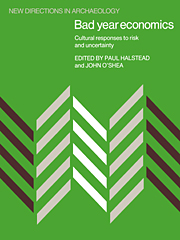Book contents
- Frontmatter
- Contents
- List of contributors
- List of figures
- List of tables
- Preface
- 1 Introduction: cultural responses to risk and uncertainty
- 2 The spirit of survival: cultural responses to resource variability in North Alaska
- 3 Saving it for later: storage by prehistoric hunter–gatherers in Europe
- 4 The role of wild resources in small-scale agricultural systems: tales from the Lakes and the Plains
- 5 The economy has a normal surplus: economic stability and social change among early farming communities of Thessaly, Greece
- 6 Changing responses to drought among the Wodaabe of Niger
- 7 Of grandfathers and grand theories: the hierarchised ordering of responses to hazard in a Greek rural community
- 8 Risk and the polis: the evolution of institutionalised responses to food supply problems in the ancient Greek state
- 9 Monitoring interannual variability: an example from the period of early state development in southwestern Iran
- 10 Public intervention in the food supply in pre-industrial Europe
- 11 Conclusion: bad year economics
- References
- Index
- ALSO IN THIS SERIES
7 - Of grandfathers and grand theories: the hierarchised ordering of responses to hazard in a Greek rural community
Published online by Cambridge University Press: 26 October 2009
- Frontmatter
- Contents
- List of contributors
- List of figures
- List of tables
- Preface
- 1 Introduction: cultural responses to risk and uncertainty
- 2 The spirit of survival: cultural responses to resource variability in North Alaska
- 3 Saving it for later: storage by prehistoric hunter–gatherers in Europe
- 4 The role of wild resources in small-scale agricultural systems: tales from the Lakes and the Plains
- 5 The economy has a normal surplus: economic stability and social change among early farming communities of Thessaly, Greece
- 6 Changing responses to drought among the Wodaabe of Niger
- 7 Of grandfathers and grand theories: the hierarchised ordering of responses to hazard in a Greek rural community
- 8 Risk and the polis: the evolution of institutionalised responses to food supply problems in the ancient Greek state
- 9 Monitoring interannual variability: an example from the period of early state development in southwestern Iran
- 10 Public intervention in the food supply in pre-industrial Europe
- 11 Conclusion: bad year economics
- References
- Index
- ALSO IN THIS SERIES
Summary
This chapter is based on ethnographic data from a modern, predominantly subsistence-orientated, agricultural community in southern Greece. The community's environmental background is summarised with special reference to the inherent variability of factors affecting crop production, and several superficially ‘inefficient’ behaviours are identified as buffers against environmental variability. It is argued that these mechanisms do not all operate simultaneously or at the same level, but represent a hierarchised set of culturally specific responses to hazard. The interconnectedness of social and economic factors in these buffering mechanisms is discussed, and it is argued that several of these primarily economic behaviours are forces which discourage change in the social sphere.
It goes without saying that climatic – and, more broadly, environmental – factors play a crucial role in affecting agricultural communities and how they make a living. In the past, most writers on the subject of traditional or ‘primitive’ agrarian economies have tended to treat discussions of the environment in general, and climatic factors in particular, in a normative fashion, frequently not looking further than averages of rainfall, temperature and the like. This equilibrium-centred thinking frequently assumed that ‘the climate’ of a locality is essentially static from year to year, though accepting that it is punctuated by occasional hiccoughs or ‘crises’.
- Type
- Chapter
- Information
- Bad Year EconomicsCultural Responses to Risk and Uncertainty, pp. 87 - 97Publisher: Cambridge University PressPrint publication year: 1989
- 25
- Cited by



